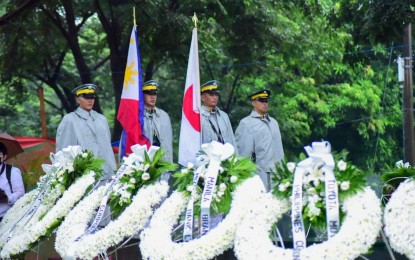
‘FORGIVING THE UNFORGIVABLE’. The Japanese Embassy and various Japanese firms offer wreaths at the tomb of former President Elpidio Quirino at the Libingan ng mga Bayani on July 13, 2023. The event highlights the significance of the clemency given by Quirino to 114 Japanese war prisoners in July 1953. (Photo courtesy of Japan Embassy in Manila)
MANILA – The Philippines continues to make a mark on Japan 70 years after its momentous decision to pardon over 100 Japanese prisoners of war (POW) from the World War II -- an act of forgiveness that paved the way for the friendly relations Tokyo and Manila enjoy today.
In a ceremony on Thursday, descendants of both former President Elpidio Quirino and Tatsuo Kono, the military painter who tirelessly appealed for clemency, gathered in Muntinlupa City, the same city where the Japanese war criminals served their sentence in the 1950s.
Quirino granted the executive clemency in July 1953 at a time when Filipinos held strong post-war anti-Japan sentiments.
The decision also came as an act of remarkable self-sacrifice and compassion for Quirino, who suffered devastating loss during the war when his wife, Alicia, and three children were killed by Japanese troops while fleeing during the Battle of Manila.
“As Ambassador of Japan to the Philippines, I am deeply grateful to President Quirino for making this decision with an eye to the future of Japan-Philippines relations,” Japan Ambassador to the Philippines Kazuhiko Koshikawa said in his remarks.
“At that time, many Japanese people expressed their profound gratitude for his compassionate gesture which had a decisive and lasting impact on our bilateral ties.
Today, Japan and the Philippines stand shoulder-to-shoulder as like-minded friends and strategic partners, having built an extremely amicable and trusting relationship,” he added.
Koshikawa said many Filipinos now regard Japan in a positive light, with 80 percent saying that they trust the country.
“This remarkable development in our friendship would have been impossible without the diligent efforts of President Quirino and our predecessors,” he said.
At the Libingan ng mga Bayani in Taguig City, Koshikawa and various Japanese companies and organizations also offered a wreath at Quirino’s tomb.
READ. A Tale of Two Presidents — Normalization of relations with Japan
Kayoko Kano, the daughter of Tatsuo, was also present during the ceremony.
Tatsuo was the man behind the series of letters sent to President Quirino asking him to “forgive the unforgivable,” inspired by the remorse of one of the pardoned Japanese prisoners Rear Admiral Takasue Furuse.
Furuse, during his first meeting with Kono in 1945, acknowledged that “the war was a mistake” and conveyed that his guilt of sending “a young man with a future to death is great”.
He returned to Manila to stand trial in 1946 and was eventually sentenced to death by a Manila military court in March 1946, sparking Kono’s one-man movement.
At that time, Kayako said she was four and used to accompany her father in sending the letter from their hometown in Shimane to Tokyo.
In his fourth letter sent in 1949, Tatsuo wrote to Quirino:
“In the two hundred days since my first request, I have been living a life of penitence, and have reflected on the brutality and evil of war, which I must be conscious of as a member of the same nation as Furuse and the other Japanese war criminals.”
“Only by the miracle of ‘forgiving the unforgivable’ can humankind achieve eternal peace, and I feel more strongly than ever that peace cannot be achieved with ‘an eye for an eye.”
The petition went on for years and on July 4, 1953, Malacanang announced that Quirino has decided to grant executive clemency on 114 Japanese prisoners— a move deemed to be based on “humanitarian motives and the fostering of early restoration of normal relations between the Philippines and Japan.”
In extending the pardon, Quirino said: “I should be the last one to pardon them as the Japanese killed my wife and three children and five other members of the family. I am doing this because I do not want my children and my people to inherit from me hate for people who might yet be our friends for the permanent interest of the country. After all, destiny has made us neighbors.”
“I am happy to have been able to make this spontaneous decision as the head of a Christian nation. My fervent hope is that the benevolent feeling which has inspired me will strike a responsive chord in others as an act of faith to humanity. Love of fellow creatures will always be the supreme law among men and nations and the basis of world peace.” (PNA)
